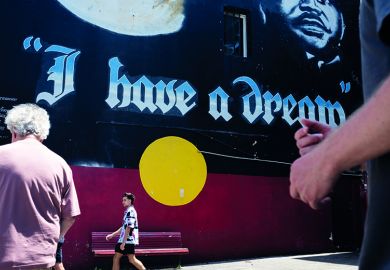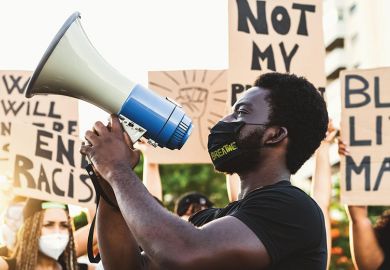Australia’s top-ranked university has become the latest to take sides in the forthcoming referendum on an indigenous voice to parliament.
In a statement posted on its website, the University of Melbourne says its council and executive “affirm their support for the Uluru Statement from the Heart and the ‘yes’ position in the referendum”.
The statement says the university will maintain its role of “actively facilitating” informed debate, and that free expression is “fundamental” to its mission. “Not everyone will vote ‘yes’ and we fully respect that. All members of our community are entitled to engage in robust, evidence-based and respectful expression of their views.”
Melbourne’s gesture follows a similar move by UNSW Sydney, which has formally backed an indigenous voice to parliament, while University of South Australia vice-chancellor David Lloyd has proclaimed that universities “shouldn’t sit on the fence” over the issue.
And the University of Wollongong formally backed the referendum’s underpinning document, the Uluru Statement from the Heart, at a council meeting last April. “[It] is a necessary step to ensuring…that first nations people finally receive the…voice in the Australian constitution that they need and so richly deserve,” said vice-chancellor Patricia Davidson.
Representative group Science & Technology Australia has also vowed to advocate for a “resounding” yes vote. “The call for indigenous constitutional recognition and a voice to parliament has been made by generation after generation of Aboriginal and Torres Strait Islander leaders and campaigners across the past century,” said chief executive Misha Schubert.
While support for the yes case appears strong in universities, it is not universal. Some student representatives and activists oppose the referendum as a distraction from the struggle for indigenous sovereignty and a treaty with white Australia.
At the other end of the ideological spectrum, some campaigners consider the voice an overreach that gives indigenous people too much political influence. Claims along these lines inevitably spark heated debate, given the long history of oppression of Aboriginal Australians and the significant disadvantage many experience.
Observers say universities taking sides in such debates runs counter to the principle of institutional neutrality – a concept refined almost 60 years ago as part of the University of Chicago’s deliberations around its role in society. A 1967 report commissioned by Chicago’s Nobel-winning president, George Beadle, insisted that universities must keep at arm’s length from “political fashions, passions and pressures”.
“The university is the home and sponsor of critics; it is not itself the critic,” the report says. “It is a community which cannot take collective action on the issues of the day without endangering the conditions for its existence and effectiveness.”
Nova Scotia philosopher Mark Mercer, president of Canada’s Society for Academic Freedom and Scholarship, said the apparent lack of commitment to institutional neutrality in Australian academia was “disheartening”.
UNSW Sydney constitutional lawyer and indigenous leader Megan Davis offered a different view when she addressed the Universities Australia conference last month. “I don’t really stomach the ‘We are mere facilitators of the debate’ approach.
“Universities say they don’t want to be political, but…we have strong positions on freedom of speech, which is political. We withdraw from investing in some industries, which is political.”
Dr Mercer said honouring institutional neutrality was also political. “It’s to affirm the mission of universities in a free, liberal and democratic society.”
Register to continue
Why register?
- Registration is free and only takes a moment
- Once registered, you can read 3 articles a month
- Sign up for our newsletter
Subscribe
Or subscribe for unlimited access to:
- Unlimited access to news, views, insights & reviews
- Digital editions
- Digital access to THE’s university and college rankings analysis
Already registered or a current subscriber?










